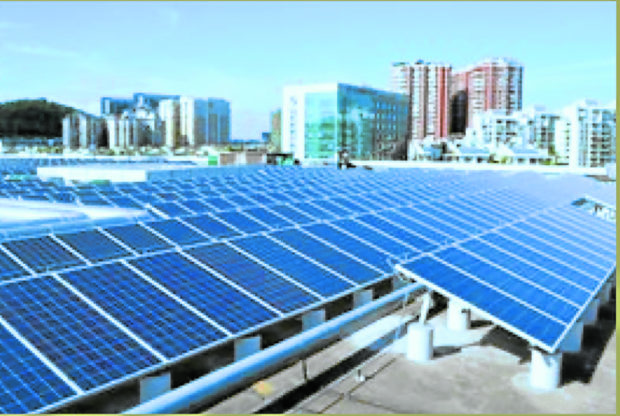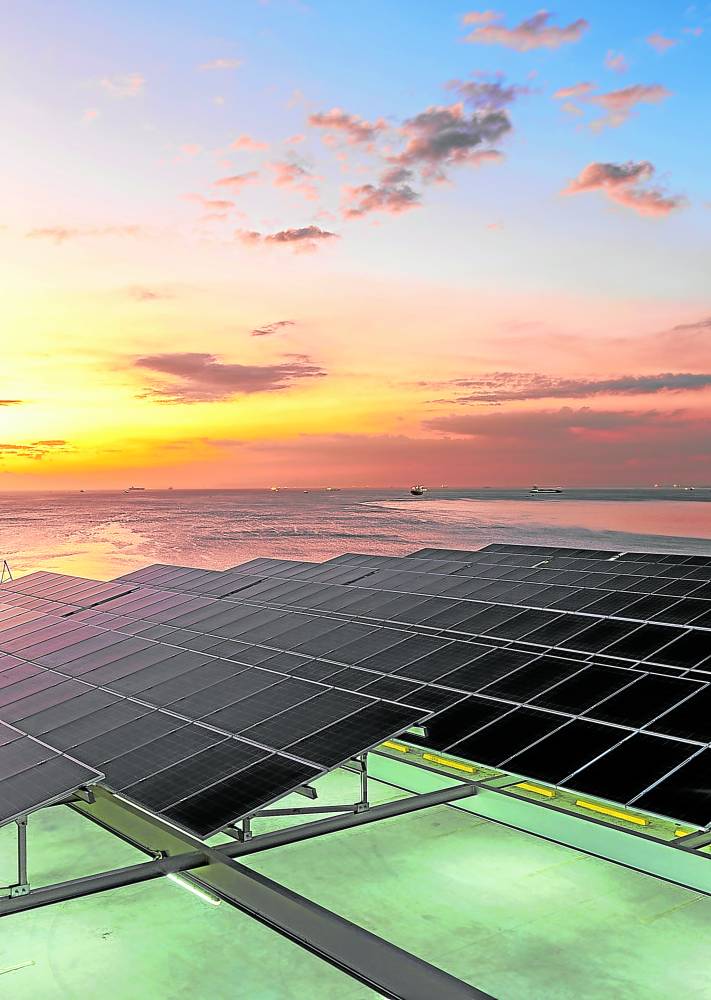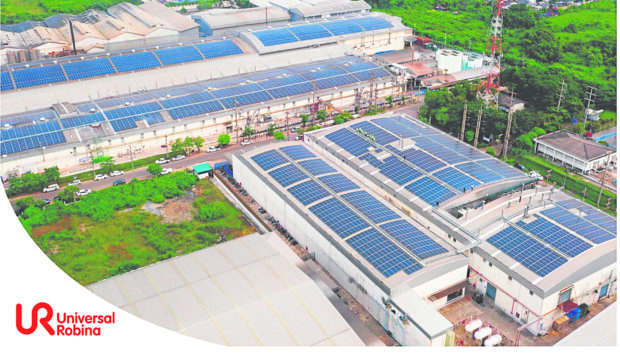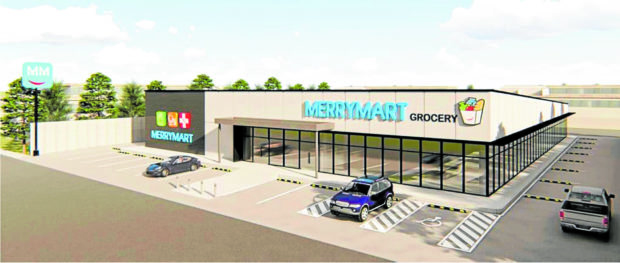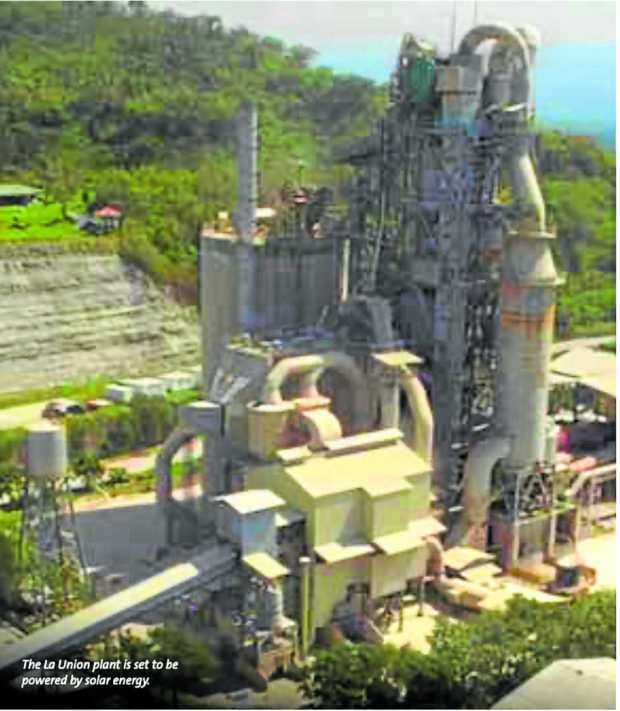The greening of corporate Philippines
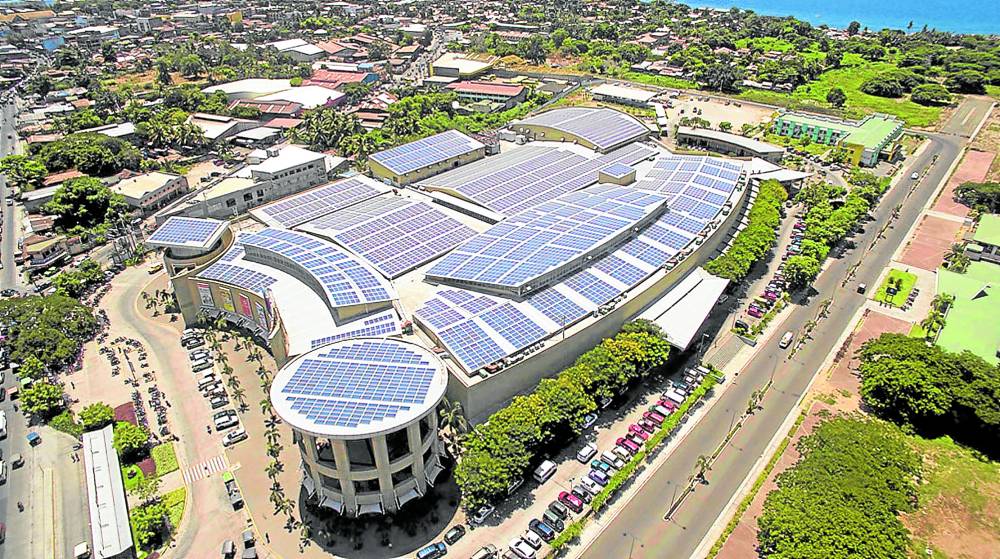
ENERGIZING ROOFTOP Robinsons Place Dumaguete is among the 24 solar-powered Robinsons malls with a combined
generation capacity of 30.79 megawatts. —CONTRIBUTED PHOTO
The country’s top corporations are ramping efforts to switch to cleaner renewable energy (RE) sources as rising global temperatures and climate change pose an existential threat to the planet’s future.
Manufacturers, retailers and property giants are collectively curbing the use of dirty power sources at a time when investors and stakeholders demand more sustainable business practices.
This is also in step with the Philippine government’s commitments to the Paris Climate Agreement and the 2021 United Nations Climate Change Conference of the Parties or COP26.
Former President Rodrigo Duterte signed the Paris climate pact in 2017. The country later pledged to reduce emissions by 75 percent by 2030.
Coal power plants still supply most of the country’s energy needs and it will take years before enough RE supply could replace and support future demand. Nevertheless, companies have started to embark on meaningful steps to achieve cleaner and more sustainable operations.
Article continues after this advertisementSolar on malls
Among these is Sy-led SM Prime Holdings, which is equipping malls with 10.6 megawatts of solar rooftop capacity and watcher catchment facilities to cut water usage.
Article continues after this advertisement“Your company committed to increase the share of RE in its electricity consumption by up to 50 percent across its various business segments by the end of 2022, in support of the Department of Energy (DOE) program to move up the RE supply component of the country to 35 percent by 2030,” SM Prime says in its latest sustainability report.
“In this initiative, SM Prime will have more than 50 facilities under the DOE’s Retail Competition and Open Access scheme utilizing RE and providing affordable and clean power to its tenant-partners, minimizing carbon footprint emission in our operations,” it adds.
Ayala Land Inc., part of conglomerate Ayala Corp., says its main strategy to cut emissions is to source RE via power purchase agreements with electricity suppliers.
The builder says eight more buildings shifted to RE in 2021 for a total of 65 buildings representing 85 percent of total gross leasable area, its sustainability report shows.
This also cut net emissions by about 164,000 metric tons of carbon dioxide equivalent.
Ayala Land adds that commercial properties alone reached carbon neutral status, a year ahead of its target in 2022.
Ayala Corp. as a conglomerate announced a commitment to achieve net-zero emissions by 2050. This includes controllable emissions from fuel, refrigerant and electricity use and all other emissions from its value chain, including those of its suppliers, tenants and customers.
Robinsons Land now has 24 malls with solar power facilities with a combined capacity of 30.79 MW, equivalent to planting 1.43 million trees and cutting greenhouse gases by 86,359.41 metric tons.
RE-powered factories
Food and beverage giant Universal Robina Corp. (URC) of the Gokongwei Group recently announced “more ambitious” sustainability targets, which includes accelerating the shift to RE.
Earlier this year, the maker of C2 iced tea and Jack ’n Jill snacks signed agreements with various power generation firms to supply 20 of its factories with geothermal, solar and hydro energy. These include facilities in Pasig, Laguna, Cavite, Pampanga, Antipolo and Bulacan, as well as facilities in Cebu and Negros Occidental.
Overseas, URC installed solar panels in six factories and four warehouses at its compound in Samut Sakhon province, southwest of Bangkok. Its Vietnam subsidiary is also installing a 3 MW solar rooftop system in its coffee plant located in the Vietnam Singapore Industrial Park Binh Duong.
David Lim, chief sustainability officer of URC, says the goal is to “have all our plants utilize electricity from 100 percent RE by 2025.”
Snowballing efforts
Retailers are taking similar steps to incorporate RE and energy efficient features in their stores.
Tycoon Edgar “Injap” Sia II’s MerryMart recently sealed a 15-year lease deal with Ayala Land to build full-size eco-friendly supermarkets in Nuvali, Laguna, and Ayala Cresendo Tarlac projects.
The stores will feature roof solar panels, LED lighting, bicycle and electric car charging facilities.
The Villar Group’s AllHome retail chain is also incorporating sustainability features in its stores.
“We consider areas that can optimize our investment in solar panels. As of 2021, nine stores have been installed with solar panels, with six of the large-format stores newly installed with solar panels,” the group says in its latest sustainability report. This conversion to RE sources has provided an estimated 8 to 10 percent energy savings to the stores’ consumption.
Toyota Motor Philippines (TMP) pledged to cut carbon emissions “completely” and to use 100 percent RE in its manufacturing plant by 2035, according to the latest report of Ty-led GT Capital Holdings.
“Knowing full well that the industry has the duty and capability to decarbonize, TMP drives its local network’s efforts toward accomplishing the Toyota Global Environmental Challenge,” says the company.
“It also aims to offer a wider range of sustainable vehicle choices by introducing more models equipped with electrified vehicle technology in the Philippine market,” it adds.
Top cement producer Holcim Philippines says the use of alternative fuels and raw materials in cement production is key to lowering its carbon footprint and its consumption of nonrenewable resources in its operations.
Cutting grid dependence
In November last year, Holcim sealed a 20-year deal with multinational RE company Blueleaf Energy, which will make it the first cement maker in the country with onsite solar power plant. Under the deal, Blueleaf Energy will deliver solar power to Holcim’s manufacturing hubs in Bulacan and La Union. It will also finance, build, operate and maintain the solar energy facilities with a combined capacity of 29 MW and generation of more than 50 gigawatt hours every year. This will supply up to 15 percent of the two Luzon plants’ energy requirements by 2024.
“The transition to renewable energy source will cut dependence on the Luzon power grid with mostly coal-fired power plants. Construction of the solar facilities will commence in 2022 and the solar set-up will be fully operational by 2024,” Holcim says in its latest annual report.
PLDT Inc. says it will boost renewable energy usage in operations. This will involve the use of solar power and fuel cell for cell sites and the use of hybrid generators and invest in environmental programs such as carbon footprint offsetting initiatives, the telco giant says in its annual report.
‘Net-zero’ aspiration
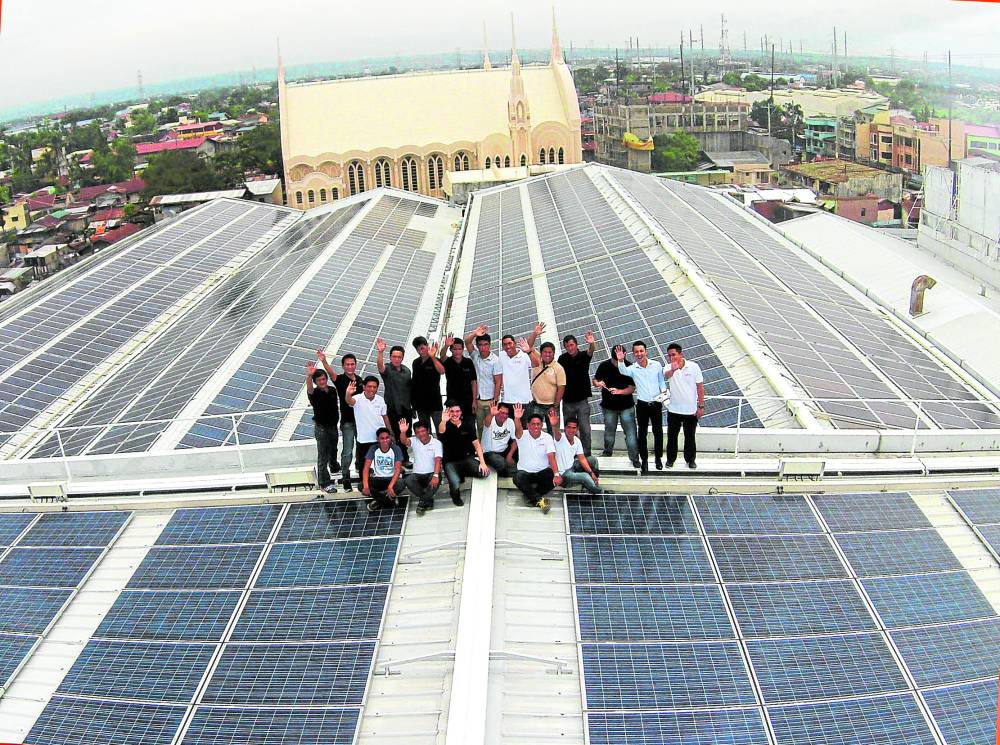
The team behind Solar Philippines, on the rooftop of Central Mall Binan, the site of the first and largest own- use solar rooftop power plant in Southeast Asia. CONTRIBUTED PHOTO
In July, Manila Electric Co. subsidiary, Spectrum, announced the completion of the “energization” of solar facilities for five PLDT business centers in the Visayas.
PLDT is working with the telco organization GSMA and partners on setting emissions targets “with a clear goal of achieving net zero emissions by 2050.”
It is also reviewing a host of alternative energy sources such as “fuel cell, solar power solutions and marine renewable energy using ocean currents.”
Fuel-cell powered cell sites can be an “environment-friendly alternative that will simultaneously address connectivity issues in challenged-grid areas nationwide.”
“The system is based on methanol-powered fuel, which can be combined with solar, wind and other renewable resources to present a sustainable, cost-effective ecosystem,” says PLDT.
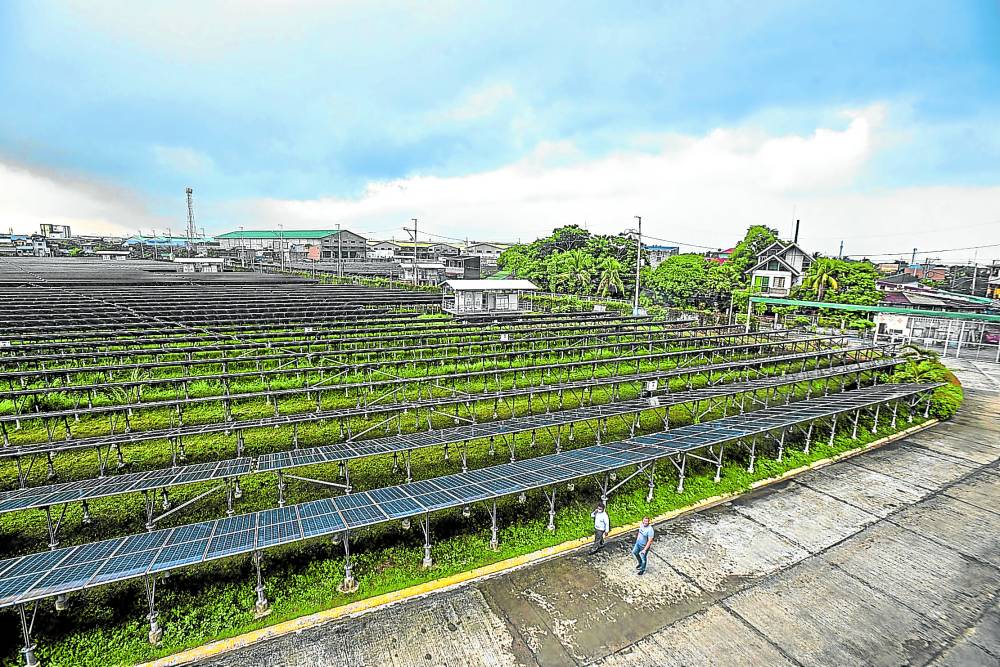
Employees walk past solar panels at a solar energy farm owned and operated by Valenzuela Solar Energy Inc in Valenzuela, suburban of Manila on May 28, 2022. (Photo by Maria TAN / AFP)
Globe Telecom of the Ayala Group is targeting 50 percent carbon reduction by 2030 and net zero emissions by 2050. To cut indirect emissions, it has shifted 13 high-energy utilization sites to RE, such as its headquarters and several other corporate facilities and data centers through power purchase agreements with electricity suppliers.
Globe is also exploring “alternative technologies” to generator sets as backup power sources.
“With its commitment to set science-based targets aligned with the 1.5-degree celsius levels, Globe aims to secure approval of its science-based targets with SBTi (Science Based Target Initiative) by 2023,” says the company.
More financial institutions are also joining the global effort to lower greenhouse gas emissions by cutting financial access for dirty power producers.
Security Bank Corp. recently pledged to end funding for coal-fired power projects in the country by 2033. Bank of the Philippine Islands earlier became the country’s first lender to commit to halve its coal financing in its portfolio by 2026 and reduce it to zero by 2032. RCBC has stopped lending to new coal-fired power plants.
